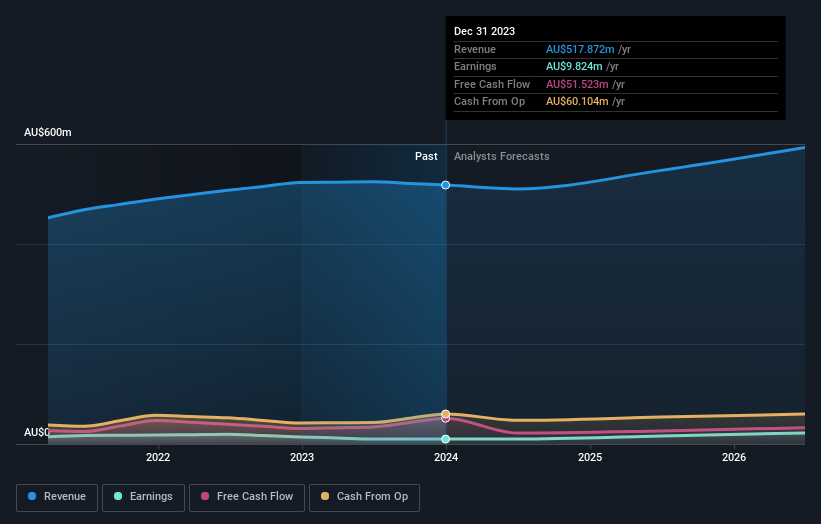While institutions invested in Baby Bunting Group Limited (ASX:BBN) benefited from last week's 11% gain, individual investors stood to gain the most
Key Insights
Significant control over Baby Bunting Group by individual investors implies that the general public has more power to influence management and governance-related decisions
50% of the business is held by the top 19 shareholders
A look at the shareholders of Baby Bunting Group Limited (ASX:BBN) can tell us which group is most powerful. And the group that holds the biggest piece of the pie are individual investors with 48% ownership. Put another way, the group faces the maximum upside potential (or downside risk).
Following a 11% increase in the stock price last week, individual investors profited the most, but institutions who own 47% stock also stood to gain from the increase.
Let's delve deeper into each type of owner of Baby Bunting Group, beginning with the chart below.
See our latest analysis for Baby Bunting Group
What Does The Institutional Ownership Tell Us About Baby Bunting Group?
Institutions typically measure themselves against a benchmark when reporting to their own investors, so they often become more enthusiastic about a stock once it's included in a major index. We would expect most companies to have some institutions on the register, especially if they are growing.
We can see that Baby Bunting Group does have institutional investors; and they hold a good portion of the company's stock. This suggests some credibility amongst professional investors. But we can't rely on that fact alone since institutions make bad investments sometimes, just like everyone does. If multiple institutions change their view on a stock at the same time, you could see the share price drop fast. It's therefore worth looking at Baby Bunting Group's earnings history below. Of course, the future is what really matters.
Baby Bunting Group is not owned by hedge funds. Our data shows that Australian Super Pty Ltd is the largest shareholder with 13% of shares outstanding. For context, the second largest shareholder holds about 7.5% of the shares outstanding, followed by an ownership of 5.9% by the third-largest shareholder.
After doing some more digging, we found that the top 19 have the combined ownership of 50% in the company, suggesting that no single shareholder has significant control over the company.
While studying institutional ownership for a company can add value to your research, it is also a good practice to research analyst recommendations to get a deeper understand of a stock's expected performance. There are plenty of analysts covering the stock, so it might be worth seeing what they are forecasting, too.
Insider Ownership Of Baby Bunting Group
The definition of company insiders can be subjective and does vary between jurisdictions. Our data reflects individual insiders, capturing board members at the very least. Company management run the business, but the CEO will answer to the board, even if he or she is a member of it.
Most consider insider ownership a positive because it can indicate the board is well aligned with other shareholders. However, on some occasions too much power is concentrated within this group.
We can report that insiders do own shares in Baby Bunting Group Limited. In their own names, insiders own AU$8.5m worth of stock in the AU$233m company. It is good to see some investment by insiders, but we usually like to see higher insider holdings. It might be worth checking if those insiders have been buying.
General Public Ownership
The general public-- including retail investors -- own 48% stake in the company, and hence can't easily be ignored. This size of ownership, while considerable, may not be enough to change company policy if the decision is not in sync with other large shareholders.
Next Steps:
I find it very interesting to look at who exactly owns a company. But to truly gain insight, we need to consider other information, too. For instance, we've identified 1 warning sign for Baby Bunting Group that you should be aware of.
Ultimately the future is most important. You can access this free report on analyst forecasts for the company.
NB: Figures in this article are calculated using data from the last twelve months, which refer to the 12-month period ending on the last date of the month the financial statement is dated. This may not be consistent with full year annual report figures.
Have feedback on this article? Concerned about the content? Get in touch with us directly. Alternatively, email editorial-team (at) simplywallst.com.
This article by Simply Wall St is general in nature. We provide commentary based on historical data and analyst forecasts only using an unbiased methodology and our articles are not intended to be financial advice. It does not constitute a recommendation to buy or sell any stock, and does not take account of your objectives, or your financial situation. We aim to bring you long-term focused analysis driven by fundamental data. Note that our analysis may not factor in the latest price-sensitive company announcements or qualitative material. Simply Wall St has no position in any stocks mentioned.

 Yahoo Finance
Yahoo Finance 

